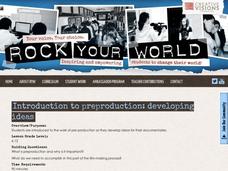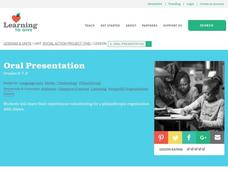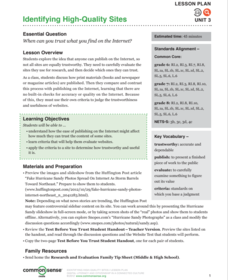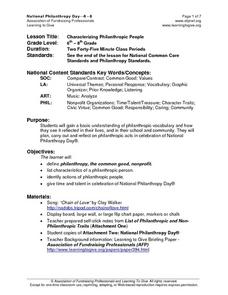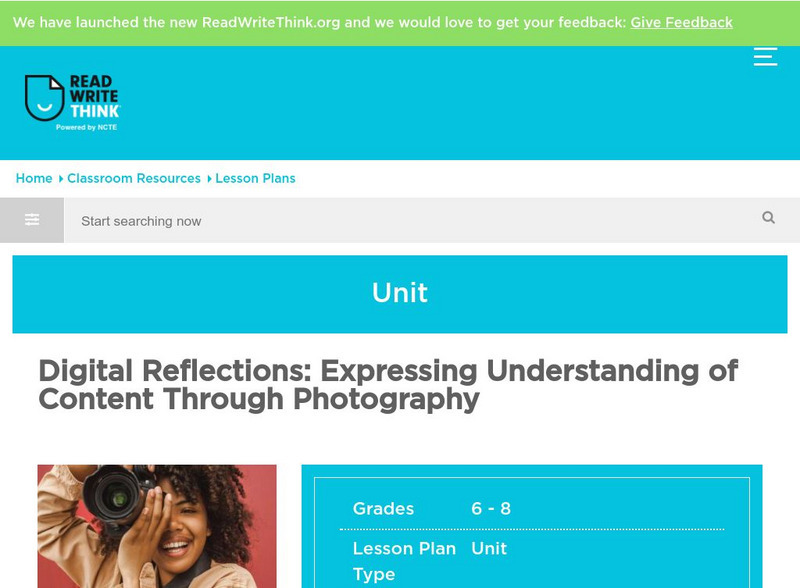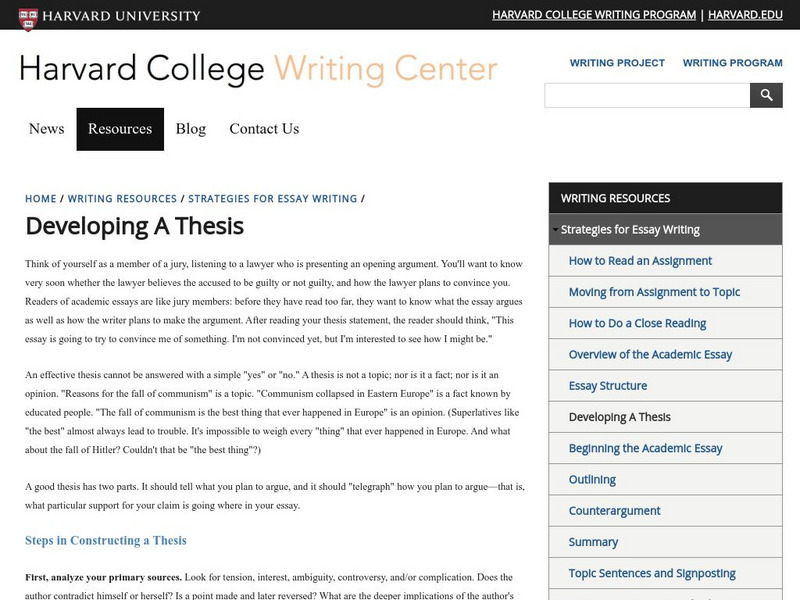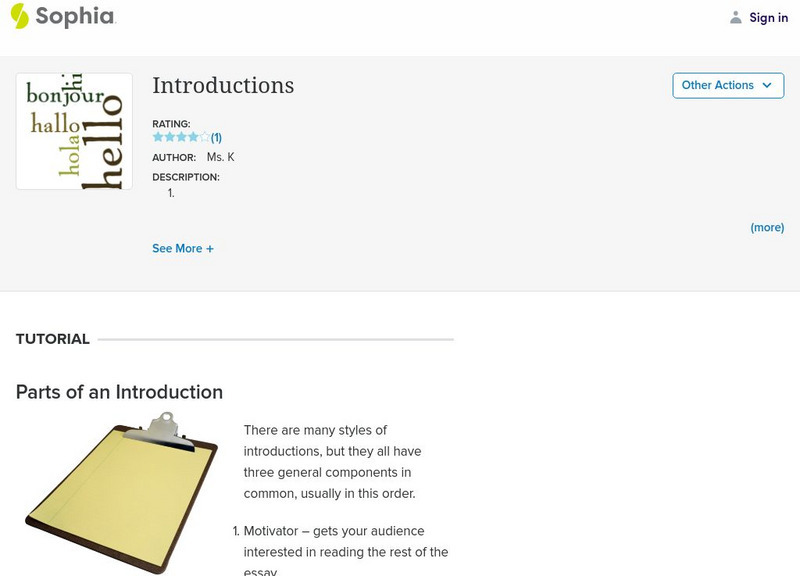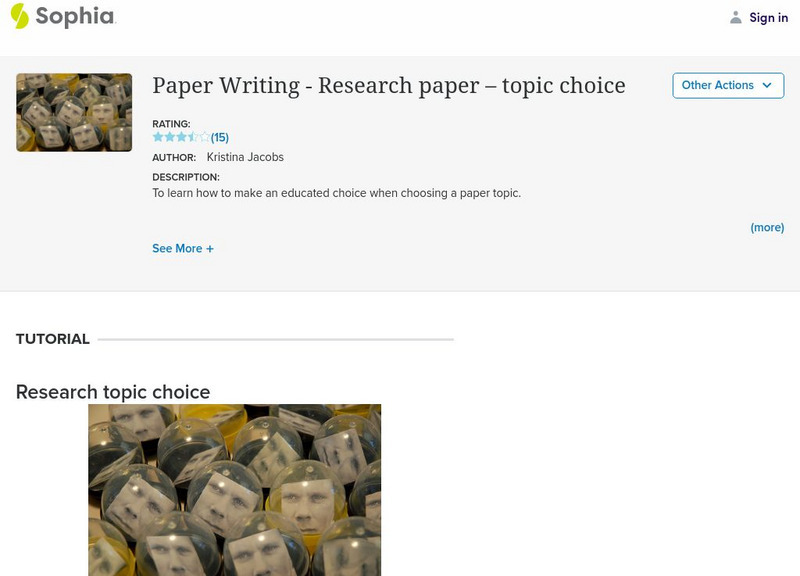Creative Visions Foundation
Introduction to Pre-production: Developing Ideas
Continue with creating documentaries with the fourth lesson in a series. After explaining the concept of preproduction, send groups off to make some decisions about their films. Groups can use the handout and the four provided questions...
Edgate
Why Map a Map?
After brainstorming reasons why Native Americans mapped their lands, your young critical thinkers will work together to review their ideas and determine the definition of a map. With today's extensive use of mapping technology and GPS...
California Academy of Science
Sustainable Fishing in the Philippines
Understanding the importance of sustainable fishing practices is fostered through a classroom game. In small groups, the class plays a fishing game where they can see first-hand, the effects of thoughtless fishing practices. After the...
Curated OER
Oral Presentation
Practice public speaking in this oral presentation lesson. Middle schoolers list the characteristics of a powerful speaker. They watch a video of two speakers, compare them and discuss the qualities of a good speech. Afterwards, they...
Common Sense Media
Cyberbullying: Be Upstanding
Peers discuss cyberbullying and how they can defend their friends that may be bullied online and offline. They discover the value in showing empathy for those who have been cyberbullied. Class members then generate multiple solutions for...
Common Sense Media
Identifying High-Quality Sites
Use a Huffington Post article focused on false pictures of Hurricane Sandy to launch a discussion about the reliability of online information. Groups compare and contrast how print and broadcast media regulate data gathering with the...
Curated OER
Fruit or Vegetable?
Watermelon is a vegetable? A tomato is a fruit? Believe it or not, this debate is decades old. Groups examine rulings by the US Supreme Court, the USDA, and state statutes before developing their own criteria to use when labeling the...
Curated OER
Harvest the Wind
Wind is a natural resource available around the world. Help your pupils appreciate the power and importance of wind by researching wind farms, making pinwheels, and designing windmills.
Curated OER
Lesson One: Characterizing Philanthropic People
Familiarize your class with philanthropy and involve individuals in philanthropic activities. First, determine the traits of philanthropic people. Class members attach sticky notes with character traits written on them to each side of at...
Curated OER
CDV, CDV, What's a CDV?
Introduce your class to the Core Democratic Values. The instructional activity focuses on defining the Core Democratic Values and related terms. Small groups look up terms and present a song based on the information they've found. After...
Other
Ljl Seminars: Using Overhead Transparencies
Here are some tips and rules to be aware of when using overhead transparencies.
ReadWriteThink
Read Write Think: Understanding Content Through Photography
This lesson plan is designed to assist middle schoolers making self-text-world connections through multimedia presentations. This plan includes a student guide for writing the reflection scripts as well as a detailed instructional plan.
Beacon Learning Center
Beacon Learning Center: Information Elimination: Lesson on Narrowing the Topic
This is a tutorial which focuses on how to narrow the topic for expository writing, how to determine what information to keep or eliminate, and what questions to ask yourself. Students respond to questions throughout. A comparison is...
Beacon Learning Center
Beacon Learning Center: Trailblazing Introductions
This tutorial focuses on the introduction for an expository essay or research paper. It states the purpose of an introduction, what should be included, and ways to begin.
Harvard University
Harvard College Writing Center: Developing a Thesis
Superbly written explanation of thesis development. Use the links on the right to work through the writing process.
Sophia Learning
Sophia: Introductions
This tutorial focuses on introductions; it lists and explains three common components of introductions: motivator, thesis, and blueprint. It provides a sample introduction with commentary showing each of the parts. It discusses the...
Sophia Learning
Sophia: Paper Writing: Research Paper: Topic Choice
This tutorial focuses on choosing a topic and narrowing or expanding the focus to fit the requirements for a research paper. It provides tips like clustering, using a Venn Diagram, Google Scholar, etc. to find and narrow the topic. It...
Sophia Learning
Sophia: Revising Thesis and Topic Sentences
This tutorial focuses on revising the thesis and topic sentences using two videos and two slideshows. The first video discusses a 3-step revising process for making sure the thesis fits the paper; the second video focuses on what...
Sophia Learning
Sophia: Topic Sentences
This slideshow lesson focuses on topic sentences; it defines them, gives the characteristics of effective topic sentences, tells what they are NOT, discusses how to create them, and provides examples of effective topic sentences.
Sophia Learning
Sophia: Topic Sentences: Map Your Way to Writing One
This tutorial on writing topic sentences includes 2 videos, 2 slide shows, and an audio clip. The first YouTube video explains the 4 parts of a topic sentence and tells where topic sentences belong. The 2 slide shows focus on the MAP...
Sophia Learning
Sophia: I Just Got Assigned a Paper, Now What?
This lesson focuses on what to do after being assigned a paper; it provides the basic steps to writing a paper: brainstorm topics, organize your thoughts (Venn diagrams, tree diagram examples), conduct preliminary research, create a...
CommonLit
Common Lit: Genetically Modified Salmon: Food or Frankenfish
CommonLit.org is a wonderful resource to use in a Language Arts classroom. Each story or article is accompanied by guided reading questions, assessment questions, and discussion questions. In addition, students can click on words to see...
Buck Institute
Buck Institute for Education: 6 8 Presentation Rubric (Ccss Aligned)
[Free Registration/Login Required] This rubric helps teachers guide students in grades 6-8 in making effective presentations in a project, and it can be used to assess their performance. Alignment with CCSS is not noted. It describes an...
Better Lesson
Better Lesson: Philosophical Chairs Discussion
Philosophical Chairs discussions allow students to make meaning of texts while developing, defending, and supporting their claims. This resource walks you through how to implement this type of discussion in your classroom. Included are...


